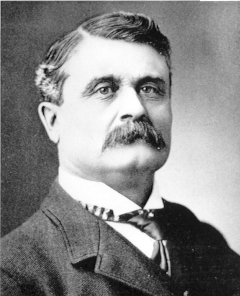We are continuing our series introducing Colorado’s governors with James B. Orman, who served one term from 1901-1903. He only served one two-year term, which was common for governors at the time. As part of the State Publications Library’s effort to digitize gubernatorial addresses, Orman’s inaugural address, biennial address, and a speech delivered during a special session are all available online.

Life before politics
Orman was born in Iowa in 1849. He made his way out to Denver in 1869 and became involved in the railroad industry, eventually forming a company that built a section of the Union Pacific railroad from Sheridan, Kansas to Denver. This began Orman’s career as a successful railroad contractor and builder.
Orman moved to Pueblo in 1874, where he met his wife, Nellie Martin Orman. They were married from 1877 until her death in 1918. Nellie was a beloved hostess and philanthropist whose laugh was described as “like the ray of sunshine, just after the storm” by one editorial. Learn more about Nellie in this digitized issue of The Colorado Magazine.
Governorship
James Orman was elected as a Democrat and was inaugurated in 1901, the same year that the Capitol Building was officially declared to be finished. His inaugural address focused on Colorado’s financial problems. The state was struggling to find funds to pay for government services following the recession of the 1890s and Orman urged the General Assembly to increase taxes. To increase state revenue, Orman also called a special session of the General Assembly to deliver a speech asking legislators to strengthen a revenue law that would require mining companies to pay their fair share of tax revenue to the state.
On May 1, 1901, 350 mine workers at the Smuggler-Union mine in Telluride walked off the job in protest of the contract pay system. The strike escalated to violence, prompting calls for Orman to send in the Colorado National Guard. He made the decision to instead send his Lieutenant Governor, David C. Coates, who was able to bring the Smuggler-Union Mining Company and the Western Federation of Miners to the bargaining table to reach a settlement.
Life after politics
After leaving office in 1903, Orman moved back to Pueblo where he retired from politics but continued his business career. He died in 1919 and is buried in Pueblo’s Roselawn Cemetery.
- Celebrating Colorado’s immigrant heritage - June 27, 2025
- Colorado’s Scenic and Historic Byways: Guanella Pass - June 6, 2025
- Who is protecting Colorado’s pollinators? - May 16, 2025